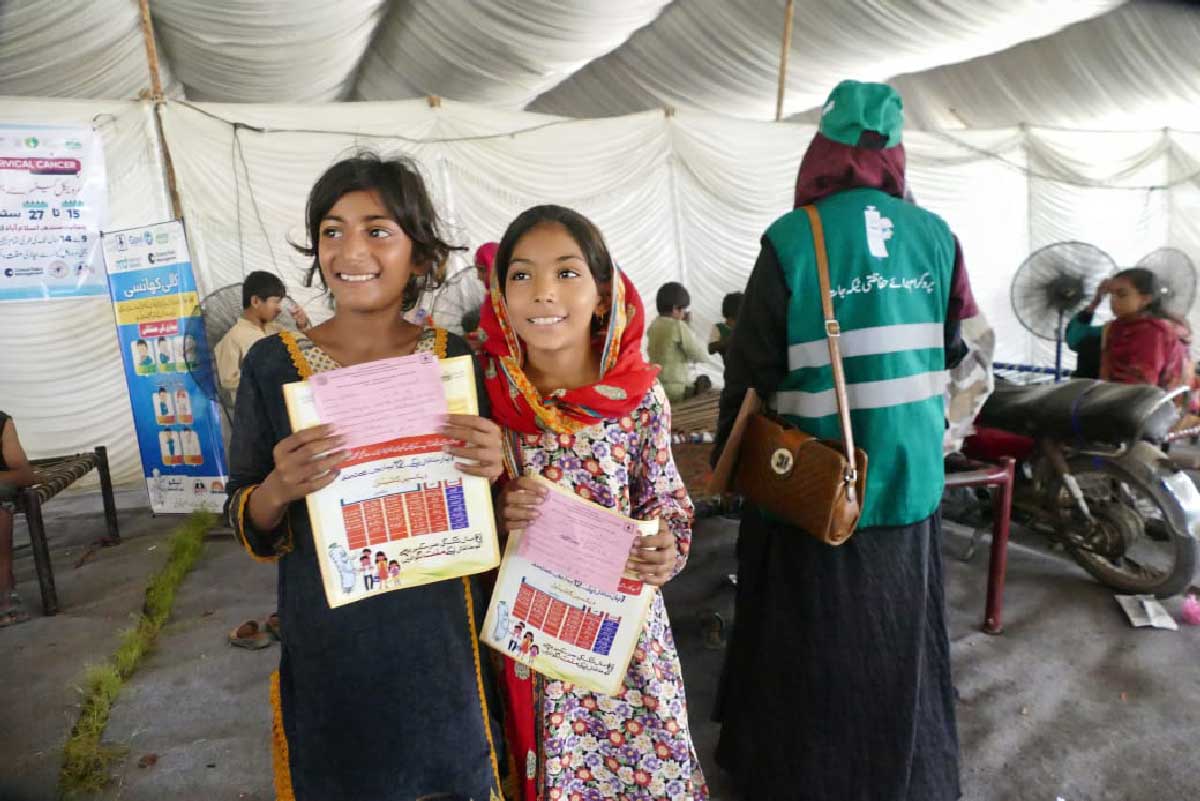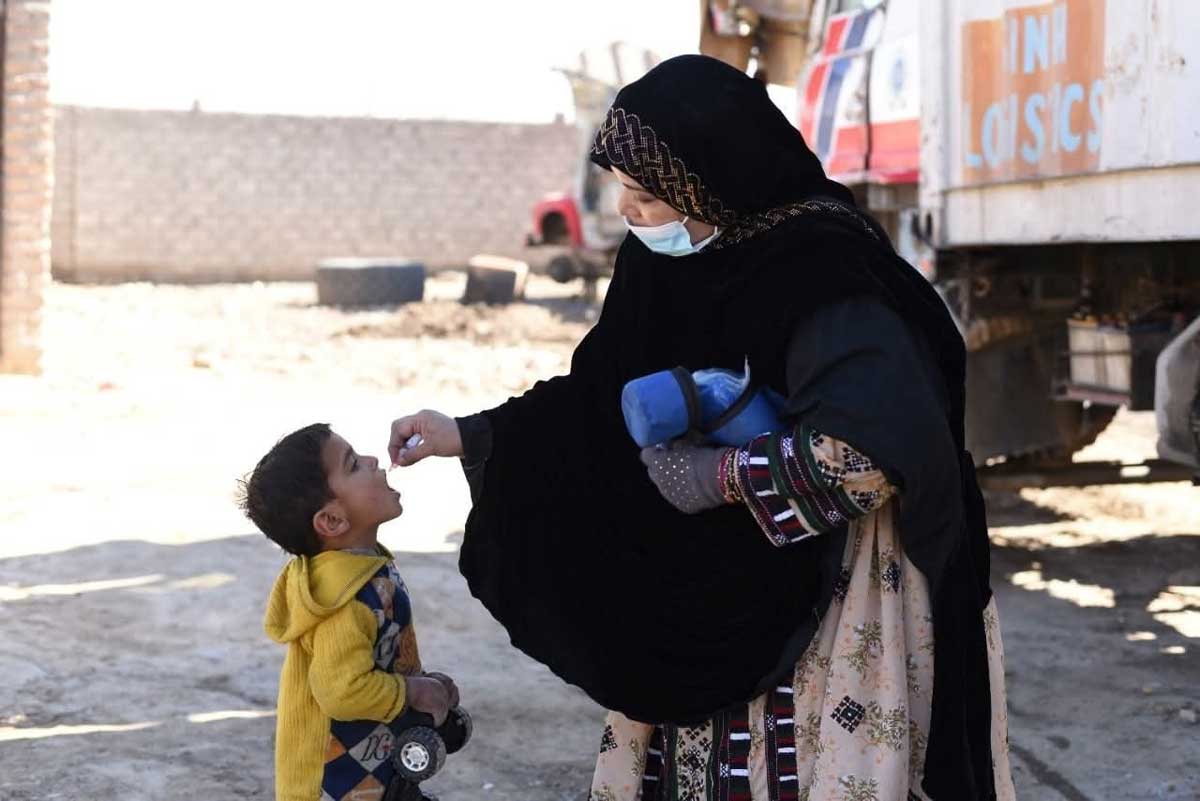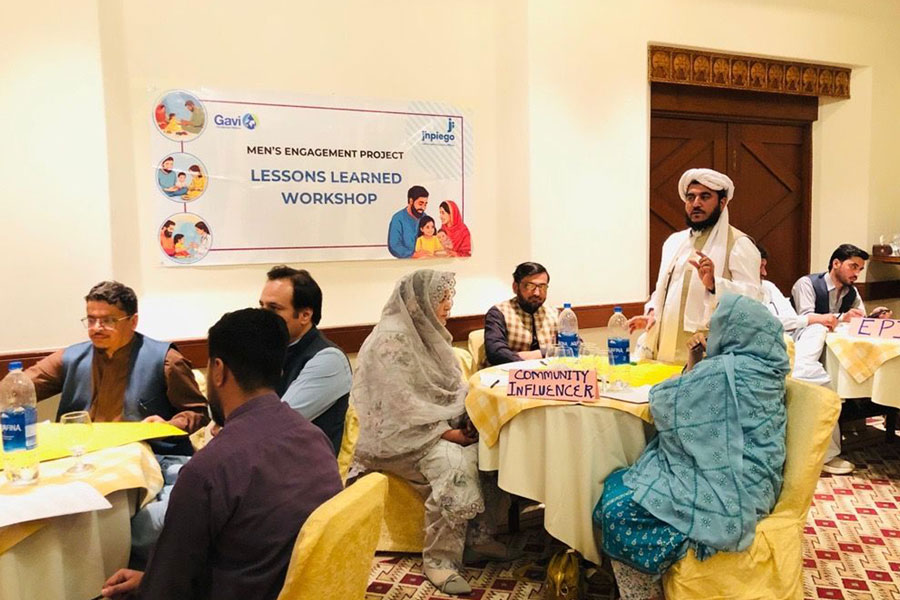How medical outreach visits to flood-affected parts of Pakistan protected thousands
2022’s disastrous floods affected 33 million Pakistanis, and left many communities cut off from healthcare, and many children missing out on vaccines. A project in Sindh set out to fix that.
- 10 March 2025
- 6 min read
- by Adeel Saeed
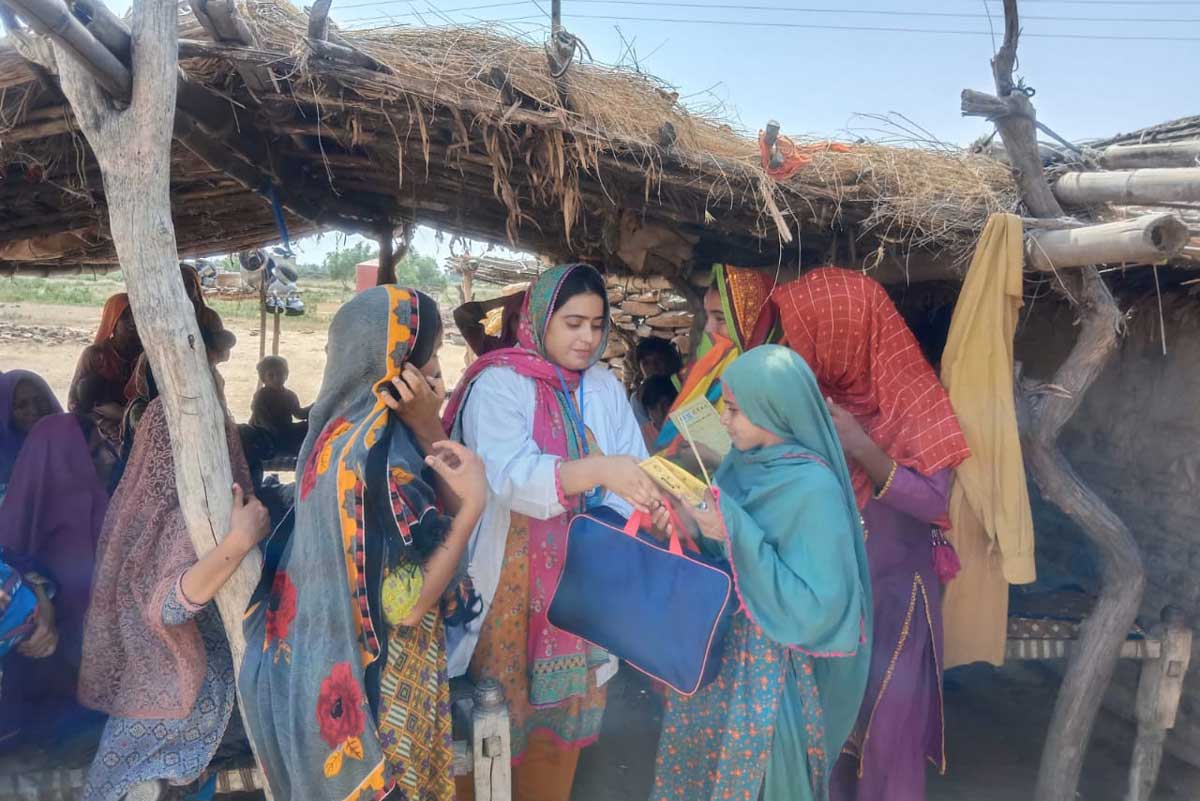
Aaishaa, wife of Asadullah Malokhani, was pale and showing other signs of anaemia following the premature birth of her son. A resident of Hashim Rustamani village in the flood-ravaged Dadu district of Pakistan, the young mother was completely unaware of the care she and her infant needed in those vulnerable early months after the birth.
But in November 2023, health workers visiting the remote communities of Sindh that had been cut off from care by the disastrous floods of 2022 arrived on her doorstep. They offered Aaishaa the polio vaccine for her infant, but she hesitated. The past year and a half had been a traumatic period, and circulating misinformation had made the young mother unsure of her next steps.
Through patient counselling and education, the health workers alleviated her concerns, eventually gaining her trust. Soon, Aaishaa not only agreed to have her baby immunised, but also connected with a trusted community midwife worker for guidance on postnatal care.
Aaishaa’s son became one of almost 6,300 children – and one of 720 previously unimmunised children – across four flood-affected districts of Sindh to be reached with routine vaccines in just over a year, as part of a Jhpiego initiative supported by Gavi. But vitally, the health teams did not stop at immunisation: the vulnerable, often still-displaced families had complex needs, and the health teams came equipped to meet them.
Mental health interventions were bundled with nutrition and maternal and child healthcare services, hygiene and sanitation help, outpatient services, and family planning counselling. So, while her son received his polio drops, Aaishaa became one of a total of 837 women to access post-natal care due to the project’s intervention; 3,000 others gained access to antenatal care. Nearly 16,000 people turned out to the health camps to take advantage of out-patient care, and more than 2,500 received psychological screening and support.
Running from October 2023 to December 2024, the project – rolled out under the aegis of Gavi’s Fragility, Emergency and Displaced Populations policy – also aimed to construct a robust and lasting referral system, and make patient access to medical care as simple as possible. Community members and local health workers say the project’s effects promise to outlive its end-date.
| District | Total out-patient visits | Ante-natal care | Postnatal care | Routine childhood vaccinations | Tetanus-Diphtheria vaccinations (for women) | Zero-dose children reached | Defaulters covered | Measles vaccinations | Health sessions | Hygiene kits | Mental health visits | Health camp |
|---|---|---|---|---|---|---|---|---|---|---|---|---|
| Larkana | 5751 | 1134 | 228 | 2317 | 1359 | 197 | 440 | 306 | 321 | 151 | 1006 | 159 |
| Kambar | 3980 | 614 | 179 | 1484 | 792 | 259 | 429 | 41 | 274 | 61 | 527 | 119 |
| Shikarpur | 2661 | 542 | 234 | 1268 | 776 | 129 | 460 | 0 | 166 | 53 | 670 | 83 |
| Dadu | 3441 | 710 | 196 | 1224 | 867 | 135 | 269 | 0 | 181 | 83 | 364 | 91 |
| Total | 15833 | 3000 | 837 | 6293 | 3794 | 720 | 1598 | 347 | 942 | 348 | 2567 | 452 |
“It’s about protecting the future”
That was always the plan, explains Dr Aminah Khan, Country Director of Jhpiego Pakistan. “The [project] model, that covered four of worst-hit districts of Sindh province including Larkana, Kamber Shahdadkot, Dadu, and Shikarpur, is not just about healing the present. It’s about protecting the future of these communities as well,” she told VaccinesWork.
A key component of the project was reconnection of people with primary health care centres. This was achieved through holding of awareness sessions and training of health workers and youth champions, Jhpiego staff explained. “We adopted an outreach mobile health camp strategy to reach remote areas, supported by social mobilisers who visited door to door and met with influential people, including religious personalities, to gain their support in educating people about importance of vaccination and primary health are for community,” said Dr Rashid Zar, Project Lead at Jhpiego.
Prayer leaders in mosques extended their support, urging people in their Friday sermons to get their children immunised on time. They also allowed the use of the mosques for making announcements through loudspeakers to inform the public about the venue and timing of upcoming health camps in their areas, Zar added.
A “true blessing”
“Access to free medical check-ups and essential immunisations right at our doorstep felt like a true blessing for the dwellers of our village for whom the nearest health facility is 20 kilometres away, and it often remains underutilised,” shared Javed Ali, a resident of Got Tori in flood-battered Dadu district.
Ali mentioned that in these localities basic medicines like Primaquine tablets, used for treatment of malaria, had not been available even during an outbreak of the disease that claimed many lives. People who had neglected their own healthcare needs for months due to financial hardships caused by floods, were seen reaching the camps to consult medics on the different medical issues they faced, Ali reported.
Since the project’s beginning, the community has become more conscious of the importance of looking out for their health, and eagerly anticipates the team's next visit, often inquiring about when they will return.
Asad Ullah, a farmer from Gobal village, echoed similar sentiments. “We lack medical staff and resources in our community. We have repeatedly requested our neighbours in Got Tori to inform us if the Jhpiego team arrives so that we too can benefit from the much-needed healthcare support,” he said.
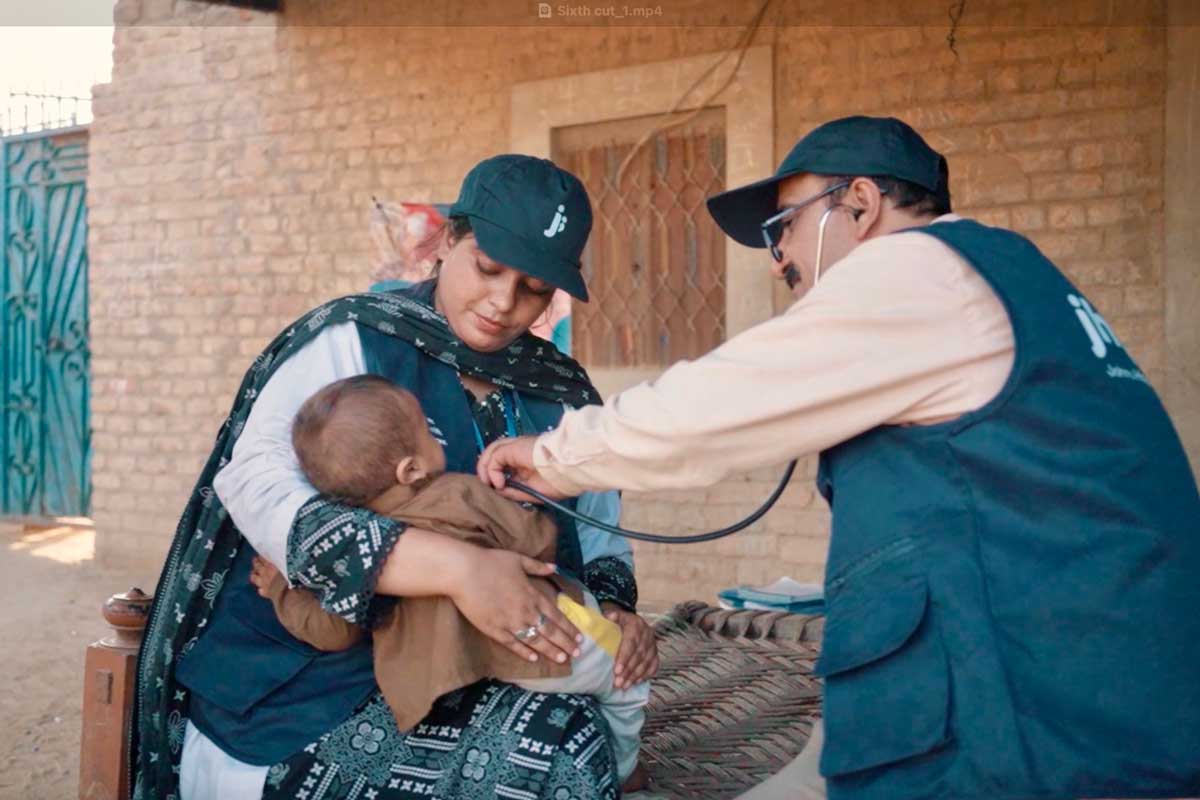
Healing mental scars
For Salma Zahid, a resident of Union Council Dorki in Larkana, the floods brought not only physical loss but also emotional scars. “The trauma of losing everything and witnessing such destruction has left an indelible mark on my mind,” she said.
During a psychological screening organised by the project, Salma was diagnosed with severe mental stress, a consequence of the devastation and destruction wreaked by the ferocious deluge. She was provided counselling and connected with psychiatrist in the nearby hospital for proper treatment – a lifeline on the arduous journey of rebuilding her life.
Have you read?
A culture of care
Not only did the project directly reach thousands with therapies and prophylactics, but local health workers say they’ve observed a lasting shift in attitudes towards healthcare. “There are countless stories of transformation – from reluctance to acceptance, and even to prioritisation of healthcare,” said Babar Ali, a community health worker volunteering with Gavi and Jhpiego in Kamber Shahdadkot district.
The disastrous floods of 2022 submerged one third of Pakistan. Stagnant water and the destruction of 3,500 km of road ruptured the communication links to often already remote areas. For many communities, access to essential healthcare became an impossibility.
“Many people remained unaware of their own well-being [needs] due to the lack of health facilities, extreme poverty preventing travel to medical centres, and widespread illiteracy. But now, change is happening,” [Babar] Ali shared.
In what public health experts call an improvement in “health-seeking behaviour”, locals began approaching community members with health-related concerns in the wake of the project’s conclusion, leading a local NGO, the Centre for Sustainable Development Society, to establish a helpline in Seelra Union Council, Kamber Shahdadkot.
A model for the future
“Such type of endeavour should continue and there should be sustainability so that in future any kind of disaster whether it is earthquake or flood the affected population should get proper healthcare services,” says Dr Muhammad Ahmad Kazi, Former Director General Federal Directorate of Immunization.
As Pakistan continues to recover from the devastating floods, initiatives like this serve as a beacon of hope, demonstrating that even in the face of adversity, sustainable change is possible.

